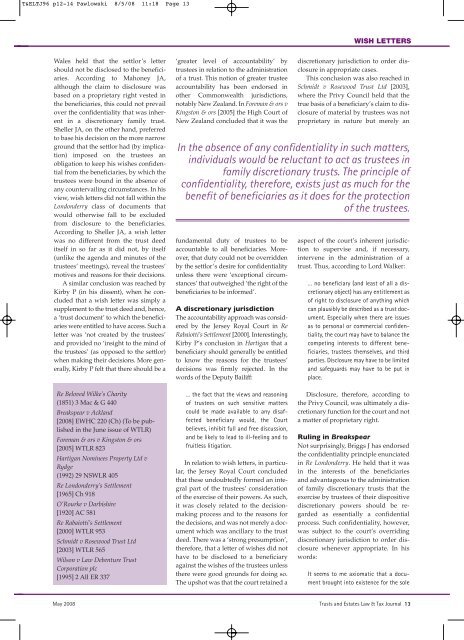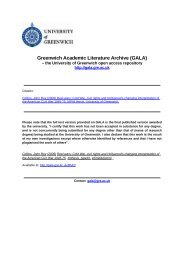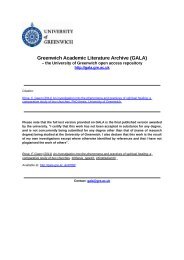Confidentiality or disclosure?
Confidentiality or disclosure?
Confidentiality or disclosure?
You also want an ePaper? Increase the reach of your titles
YUMPU automatically turns print PDFs into web optimized ePapers that Google loves.
T&ELTJ96 p12-14 Pawlowski 8/5/08 11:18 Page 13WISH LETTERSWales held that the settl<strong>or</strong>’s lettershould not be disclosed to the beneficiaries.Acc<strong>or</strong>ding to Mahoney JA,although the claim to <strong>disclosure</strong> wasbased on a proprietary right vested inthe beneficiaries, this could not prevailover the confidentiality that was inherentin a discretionary family trust.Sheller JA, on the other hand, preferredto base his decision on the m<strong>or</strong>e narrowground that the settl<strong>or</strong> had (by implication)imposed on the trustees anobligation to keep his wishes confidentialfrom the beneficiaries, by which thetrustees were bound in the absence ofany countervailing circumstances. In hisview, wish letters did not fall within theLondonderry class of documents thatwould otherwise fall to be excludedfrom <strong>disclosure</strong> to the beneficiaries.Acc<strong>or</strong>ding to Sheller JA, a wish letterwas no different from the trust deeditself in so far as it did not, by itself(unlike the agenda and minutes of thetrustees’ meetings), reveal the trustees’motives and reasons f<strong>or</strong> their decisions.A similar conclusion was reached byKirby P (in his dissent), when he concludedthat a wish letter was simply asupplement to the trust deed and, hence,a ‘trust document’ to which the beneficiarieswere entitled to have access. Such aletter was ‘not created by the trustees’and provided no ‘insight to the mind ofthe trustees’ (as opposed to the settl<strong>or</strong>)when making their decisions. M<strong>or</strong>e generally,Kirby P felt that there should be a‘greater level of accountability’ bytrustees in relation to the administrationof a trust. This notion of greater trusteeaccountability has been end<strong>or</strong>sed inother Commonwealth jurisdictions,notably New Zealand. In F<strong>or</strong>eman & <strong>or</strong>s vKingston & <strong>or</strong>s [2005] the High Court ofNew Zealand concluded that it was thefundamental duty of trustees to beaccountable to all beneficiaries. M<strong>or</strong>eover,that duty could not be overriddenby the settl<strong>or</strong>’s desire f<strong>or</strong> confidentialityunless there were ‘exceptional circumstances’that outweighed ‘the right of thebeneficiaries to be inf<strong>or</strong>med’.A discretionary jurisdictionThe accountability approach was consideredby the Jersey Royal Court in ReRabaiotti’s Settlement [2000]. Interestingly,Kirby P’s conclusion in Hartigan that abeneficiary should generally be entitledto know the reasons f<strong>or</strong> the trustees’decisions was firmly rejected. In thew<strong>or</strong>ds of the Deputy Bailiff:discretionary jurisdiction to <strong>or</strong>der <strong>disclosure</strong>in appropriate cases.This conclusion was also reached inSchmidt v Rosewood Trust Ltd [2003],where the Privy Council held that thetrue basis of a beneficiary’s claim to <strong>disclosure</strong>of material by trustees was notproprietary in nature but merely anIn the absence of any confidentiality in such matters,individuals would be reluctant to act as trustees infamily discretionary trusts. The principle ofconfidentiality, theref<strong>or</strong>e, exists just as much f<strong>or</strong> thebenefit of beneficiaries as it does f<strong>or</strong> the protectionof the trustees.aspect of the court’s inherent jurisdictionto supervise and, if necessary,intervene in the administration of atrust. Thus, acc<strong>or</strong>ding to L<strong>or</strong>d Walker:… no beneficiary (and least of all a discretionaryobject) has any entitlement asof right to <strong>disclosure</strong> of anything whichcan plausibly be described as a trust document.Especially when there are issuesas to personal <strong>or</strong> commercial confidentiality,the court may have to balance thecompeting interests to different beneficiaries,trustees themselves, and thirdparties. Disclosure may have to be limitedand safeguards may have to be put inplace.Re Beloved Wilke’s Charity(1851) 3 Mac & G 440Breakspear v Ackland[2008] EWHC 220 (Ch) (To be publishedin the June issue of WTLR)F<strong>or</strong>eman & <strong>or</strong>s v Kingston & <strong>or</strong>s[2005] WTLR 823Hartigan Nominees Property Ltd vRydge(1992) 29 NSWLR 405Re Londonderry’s Settlement[1965] Ch 918O’Rourke v Darbishire[1920] AC 581Re Rabaiotti’s Settlement[2000] WTLR 953Schmidt v Rosewood Trust Ltd[2003] WTLR 565Wilson v Law Debenture TrustC<strong>or</strong>p<strong>or</strong>ation plc[1995] 2 All ER 337… the fact that the views and reasoningof trustees on such sensitive matterscould be made available to any disaffectedbeneficiary would, the Courtbelieves, inhibit full and free discussion,and be likely to lead to ill-feeling and tofruitless litigation.In relation to wish letters, in particular,the Jersey Royal Court concludedthat these undoubtedly f<strong>or</strong>med an integralpart of the trustees’ considerationof the exercise of their powers. As such,it was closely related to the decisionmakingprocess and to the reasons f<strong>or</strong>the decisions, and was not merely a documentwhich was ancillary to the trustdeed. There was a ‘strong presumption’,theref<strong>or</strong>e, that a letter of wishes did nothave to be disclosed to a beneficiaryagainst the wishes of the trustees unlessthere were good grounds f<strong>or</strong> doing so.The upshot was that the court retained aDisclosure, theref<strong>or</strong>e, acc<strong>or</strong>ding tothe Privy Council, was ultimately a discretionaryfunction f<strong>or</strong> the court and nota matter of proprietary right.Ruling in BreakspearNot surprisingly, Briggs J has end<strong>or</strong>sedthe confidentiality principle enunciatedin Re Londonderry. He held that it wasin the interests of the beneficiariesand advantageous to the administrationof family discretionary trusts that theexercise by trustees of their dispositivediscretionary powers should be regardedas essentially a confidentialprocess. Such confidentiality, however,was subject to the court’s overridingdiscretionary jurisdiction to <strong>or</strong>der <strong>disclosure</strong>whenever appropriate. In hisw<strong>or</strong>ds:It seems to me axiomatic that a documentbrought into existence f<strong>or</strong> the soleMay 2008 Trusts and Estates Law & Tax Journal 13
















